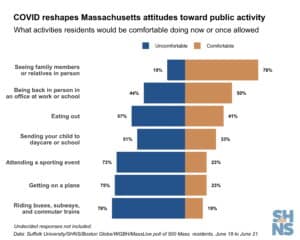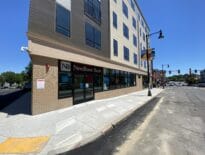The gradual reopening of the economy in Massachusetts has led to employees feeling more stable in their jobs and financial situations over the past month, according to a new Suffolk University poll for WGBH News, the State House News Service, The Boston Globe, and MassLive.
But residents continue to harbor anxiety over venturing back out to engage in what used to be mundane activities, like eating at a restaurant or taking the subway to see a baseball game. And parents are deeply divided over whether they think it’s safe to send their children back to daycare or school, according to the poll.
The pandemic has also hit communities of color particularly hard financially, according to the survey, with Hispanic residents far more likely than white, Black and Asian workers to report diminished income from the coronavirus outbreak, and workers with less education and lower incomes before the pandemic reporting a greater impact from COVID-19.
The survey of 500 Massachusetts residents was conducted June 18-21 with live callers on cellphones and landlines. It has a margin of error of 4.4 percent.
The worry still being felt across Massachusetts as the rate of new infections, deaths and hospitalizations from COVID-19 decline underscores the challenges of returning to some normalcy, and reviving an economy before a vaccine for the virus becomes available.
Over 27 percent of people said they had either an extremely high level of fear or were living through the most fearful moments of their lives, while another 39.4 percent of people said they had above average fear.
Forty-eight percent said they were somewhat or very concerned about their personal financial situation or employment, down from 56 percent in late April and early May, while the percent of people not at all concerned rose from 25.8 percent to 34.2 percent.
The number of people reporting that the pandemic had diminished their regular income was also down over nine points to 36.4 percent.
“That tide has been stemmed. It’s still high, but the trend line is going in the right direction,” said David Paleologos, director of the Suffolk University Political Research Center, which conducted the poll.
Hispanic workers were far more likely than white, Black and Asian workers to report a loss of income, with 48 percent of Hispanic residents saying they had lost income due to the coronavirus compared to 44 percent of Asian, 39 percent of Blacks and 34 percent of white residents.
Workers who earned less before the pandemic and had attained lower levels of education were also more likely to say they had seen their income diminish compared to workers with more formal education and higher salaries.
“That’s a problem,” Paleologos said. “COVID-19 has become this regressive tax on people because lower income people are hurting the most. People who can sit at home and do Zoom meetings don’t have to be out scraping for their hourly wage.”
As in all polls, smaller subsets of people carry a higher margin of error.
Only 44.2 percent of those polled said they were very strict about social distancing, compared with over 69 percent a little more than a month ago, and 11.4 said they weren’t strict at all. That trend was more evident among younger people, with only 21 percent of 18- to 24-year-olds reporting that they are “very strict” about social distancing, compared with 62 percent of those over 65.
“That just blinks a red light to me, because they could potentially be carriers,” Paleologos said.
With the exception of the nearly 78 percent of people who said they are comfortable with seeing family members and relatives in person (up six points), the reluctance to go out to eat or ride a train has remained largely unchanged over the past month.
Forty-one percent in this most recent survey said they would be comfortable dining at a restaurant, compared to 42 percent in early May, while only 19.2 percent said they’d be comfortable riding a bus, subway or commuter train, up just over one percentage point.
Only 23.4 percent of people said they’d be comfortable attending a sporting event, and 22.8 percent said they’d be alright with the idea of getting on a plane. In fact, the number of people comfortable with the idea of returning to school or the office fell from 58 percent in the last survey to 50.2 percent this month.
The 35- to 44-year-old age group was consistently the most cautious in what they felt comfortable doing, according to the poll.




 |
| 


